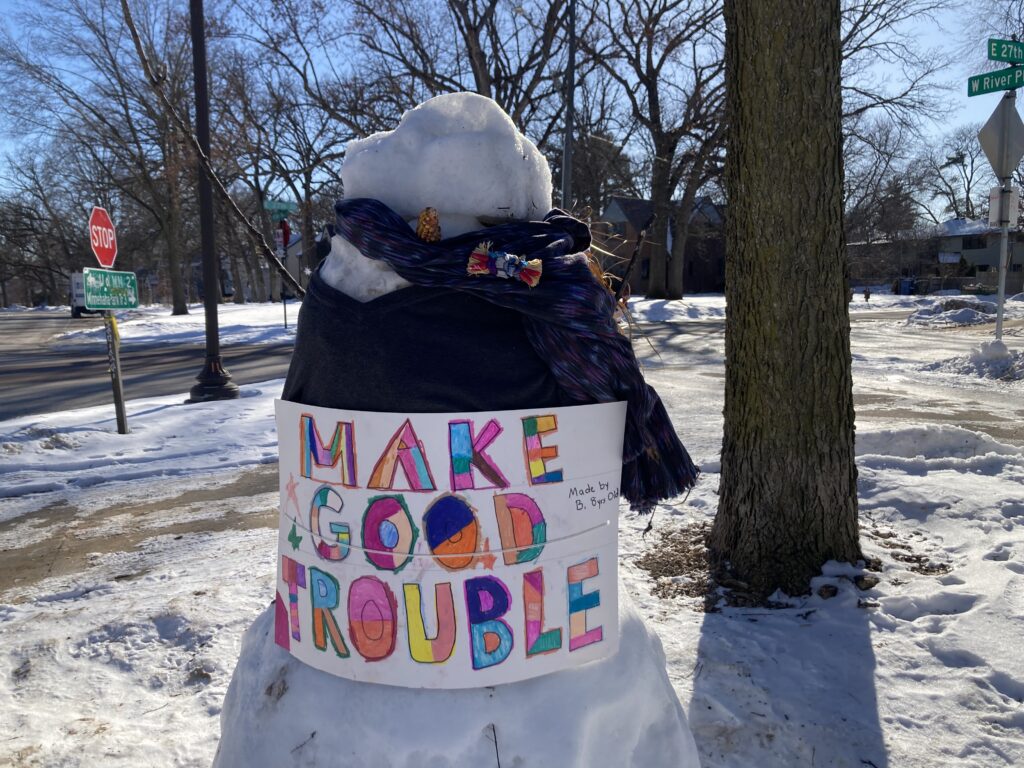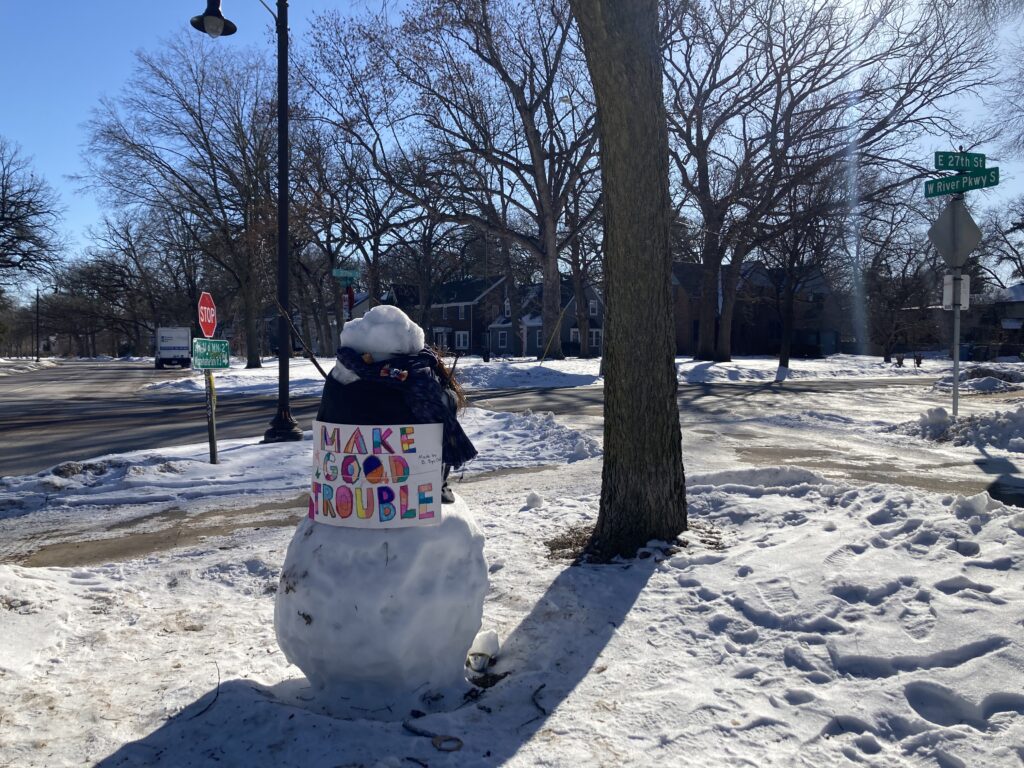4 loops
lake nokomis open swim
71 degrees
Yesterday, it was very windy and HOT — upper 90s with feels like temp of over 100 — so I decided to skip open swim last night. I’m glad I did. I think I would have been sore and tired, having battled the wind and the waves. Instead today was a great swim. Calm water and not too crowded. I felt strong and fast and confident.
Again, I couldn’t see the orange buoys, but it didn’t matter. I was fine. I’ve been writing for years about how I can’t see those buoys. Slowly, what it means to “not see the buoys” has changed. It used to be, I only see the buoys every few minutes, not all the time, or, I only see the flash of orange or a small orange dot. But today, on the way to the little beach, swimming into the sun, I only saw the buoys out of my peripheral as I swam by them, never when I was trying to sight with them. Looking straight ahead, using my central vision, I only saw glare and water, trees, and sky. This did not worry me at all. The only time I could see an orange buoy with my central vision, and again, just barely, was after I rounded the second green buoy as I swam back to the start of the loop. Mostly I could see the green buoys as the idea of green or a small green dot. One time, as I got closer (but I was still 50+ yards away), I knew I was heading toward the second green buoy but I couldn’t actually see it. I paused, lifted my head high out of the water, then turned to look out of my peripheral. There it was. When I looked through my central vision again, I could see it because now my brain knew where it was. That’s one way my brain compensates for bad cones.
On the back half of loops 3 and 4, I recited A Oswald’s “Evaporations,” A Sexton’s “A Nude Swim,” and T Hoagland’s “The Social Life of Water.” Fun! I like reciting these poems. I thought about Sexton’s line, we let our bodies lose all their loneliness and Hoaglund’s lines, all water is a part of other water and no water is lonely water. Also thought about Ed Bok Lee and his idea of water as wise, ebullient, and generous in “Water in Love.” I tried to love like the lake loves, open and generous to everything and everyone. I gave attention to feeling not lonely — connected, entangled, beholding and beholden by the fish or the lifeguards, the other swimmers, the buoys.
10+ Lake Companions
- the woman who, as she neared the safety boat by the lifeguard stand on the beach to drop off her stuff, called out, I forgot my cap in the car! Then later, when I asked, pointed out the far orange buoy to me
- the lifeguard on the shore, speaking into her walkie talkie, instructing the lifeguards where to place the buoys
- the swan boat, far off to my left
- the plane sharply ascending above me
- the small piece of debris that I accidentally swallowed then felt as it briefly got stuck in my throat
- the small piece of debris that somehow got trapped in my googles, then in my eye until I blinked it out
- the swimmers with bright pink buoys tethered to their torsos
- one of the few swimmers wearing a wet suit on this warm morning
- the breaststrokers
- the women giggling and calling out to each other as they approached the first orange buoy
- the woman discussing her swim with another swimmer after she was done, I’m slow, very very slow
All of us, together, loving the lake and each other.
Before my swim, I read a great interview between two writers discussing illness and the writing life, Sick and Writing: Two Poets Converse. Here are some passages from it that I’d like to remember and reflect on:
detection, diagnosis, disease
poetry is not so much a means of healing as it is a method of detection, occasionally therapeutic but essentially diagnostic. Which of course implies that poetry is rooted not only in dis-ease but in causes hidden.
Jennifer Sperry Steinorth
to articulate what this singular life is like, in the thick of it
Not that we’re writing to solve the mystery of being; it’s more the need to see clearly. To look at the undersides of leaves, to watch butterflies emerge from their chrysalises. To be amazed. To look at the adventure of our infirmities, even. As Marianne Boruch said, it’s about detection.
*
I’ve wondered if I write them [emotions] to feel in control, to feel in connection with others who suffer, or simply to articulate what this singular life is like, in the thick of it.
Fleda Brown
on erasures
I like the idea of receptivity with regard to erasure. I have often used the metaphor of excavation to speak of that work, though I too balk at the idea that I am digging up something that already exists, something latent in the text. Rather, it is as if I am excavating the dead from a text that buried them—a kind of channeling.
JSS
trying to find the awe in awful
The word awful has awe in it, but when I feel awful it doesn’t feel like awe—maybe it should. Pain alienates us from one another, from ourselves, and from language. It disrupts connectivity. But through writing or other forms of making, we struggle against that disconnect.
jss
on taking walks in order to face the lion
I sometimes need multiple walks a day; movement outside in the ordinary splendor of the world allows me to enter the tragic spaces of the past and the ongoing darkness in the world and in myself, without being swallowed by it. Jane Hirshfield talks about this in her wonderful essay “Facing the Lion,” inspired in part by Allen Ginsberg’s poem “The Lion for Real,” “The trick then is to let the lion into the house without abandoning one’s allegiance to the world of the living: to live amid the overpowering scent of its knowledge, yet not be dragged entirely into its realm.” Moving my body out in the world—outside the intimate spaces where I write—being in conversation with others—all of these help me hold the dark and light together. That this work demands so much discipline—even when I feel otherwise stable—speaks to the toll our work can take.
jss
the relief of a diagnosis
Sometimes when I tell people my diagnoses they tell me they are sorry, and I understand they think the diagnoses are awful, and I get that, but I am so thankful for the diagnoses. It’s such a relief to know what’s wrong—even when nothing can be done to fix it.
Maybe knowing what’s wrong—the diagnosis—helps us—if not to fix what’s wrong, then to adjust our mind to new uncertainties—to let something go?
jss
Discovered that Fleda Brown has a wonderful blog, The Wobbly Bicycle. I’ll have to keep checking it out!
Here’s the poem-of-the-day from yesterday. If I had swam last night, I would have posted it then. It’s fitting for my swim this morning, thinking about my love for/of others in the water. Also, it’s a nice nod to the swimmer I heard after I exited the lake who said she was slow, very very slow.
I swim my laps today, slowly, slowly,
reaching my arms out & over, my fleshly oars,
the water silken on my skin, my body still able
to be a body & resting at the pool’s lip,
I watch other bodies slip through the blue,
how fast the young are
& how old they become, floating, floating,
forgetting the weight of years
while palm trees sway above us,
a little wind in the fronds, children playing
in the fountains, one is crying, one is eating
a peanut butter & jelly sandwich, I’m hungry
& wonder, has everything important happened
& what is more important than this,
like a secret adventure, like an affair I’m having
with everyone I see, their soft or washboard bellies,
their flat or rounded butts, their rippling hair
or shiny domes, their fragile ankles,
their beautiful bones, all our atoms swimming, swimming
& making us visible & I shove off the wall,
reaching my arms out, embracing the whole
magic show, with ten more laps to go.

